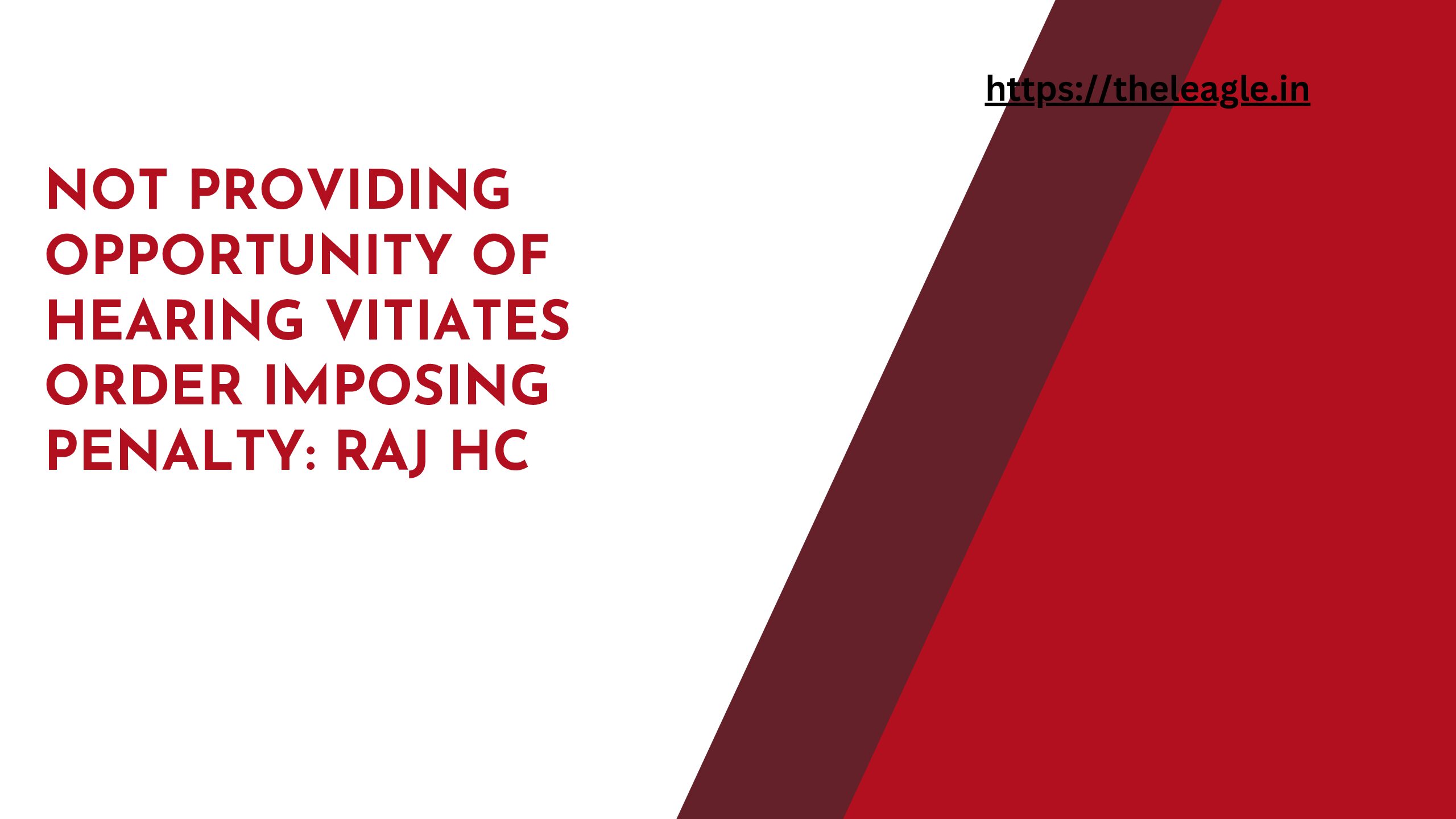In a recent decision, the Rajasthan High Court held that the petitioner’s representation – filed under Section 270AA, IT Act, 1961 – for waiving the penalty imposed under Section 270A, IT Act, 1961 was wrongly rejected without providing an opportunity of being heard. And since the impugned orders did not specifically state which sub-clause of Section 270A(9) of IT Act, 1961 are attracted in the case, the orders are quashed and set aside. It is pertinent to briefly mention the provisions in question here: under Section 270A an assessee may have to pay penalty for misreporting or under-reporting an income, but under Section 270AA, the assessee can file an application for waiver of or immunity from penalty. However, as per Proviso to Section 270AA(4) an order rejecting the application of immunity cannot be passed without providing the assessee an opportunity of being heard.
Facts
For the Assessment Year 2018-19, the petitioner filed its original return of income on 30.11.2018 and the revised return on 29.03.2019. The petitioner’s case was listed for scrutiny and an exhaustive list of issues were communicated by various notices to which the petitioner replied. During the scrutiny proceedings, the petitioner realized that it had made a provision for ‘doubtful GST ITC’ of Rs 16,30,91,496/- and had mistakenly claimed it as an expense. The said amount was suo motu surrendered by the petitioner and was added to the total income. The said amount was added to the petitioner’s total income via an assessment order but the said order also imposed a penalty on the petitioner under Section 270A for misreporting income.
The petitioner’s application under Section 270AA against the penalty order was rejected by the Deputy Commissioner. The petitioner’s revision application under Section 264 challenging the rejection was also rejected. The petitioner’s case was that no opportunity of being heard was provided to it which was in non-compliance of Section 270AA and neither did the order specify as to how it misreported the income.
Against the said rejections, the petitioner approached the Rajasthan High Court via a writ petition.
Arguments
The petitioner argued that it had filed an application against imposition of penalty under Section 270AA and the Proviso to Section 270AA(4) clearly states that an order rejecting the petitioner’s application cannot be passed without providing it an opportunity of being heard. The petitioner further assailed the Deputy Commissioner’s order on the ground that it was a one-line non-speaking order. And also that the order of revisional authority instead of correcting the flaws in the Deputy Commissioner’s order stated that the petitioner’s order fell within the ambit of Section 270A(9) clause (a) or (c). While clause (a) mentions misrepresentation of facts, clause (c) mentions claims of expenditure not substantiated by evidence. The petitioner argued that it was never specified in either of the orders how its case was covered by either of the two clauses since it voluntarily offered the amount for taxation by revising its income.
The Income Tax Department argued that the case was a clear case of misrepresentation and suppression of income since the petitioner had merged doubtful ITC for GST with its expense account. And that the revisional authority had correctly and specifically pointed that the petitioner’s case was covered by clause (a) and (c) of Section 270(9) of the IT Act, 1961. Thus, there was no need or ground for Court’s interference with the orders of the Deputy Commissioner and the revisional authority.
Decision Favors Assessee
The Rajasthan High Court accepted the petitioner’s arguments and decided that the orders of the income tax authorities should be quashed and were liable to be set aside. The High Court’s conclusion was based on three major reasons:
First, the High Court observed that it was undisputed that the amount in question had been offered by the petitioner for taxation voluntarily and was not discovered by the Income Tax Department during the scrutiny proceedings.
Second, the High Court noted that under Section 270AA(3) an assessing authority can grant an assessee immunity from penalty sought to be imposed under Section 270A, but the Proviso to Section 270AA(4) makes it clear that an order rejecting the assessee’s application for immunity cannot be passed without providing an opportunity of being heard. And while in the impugned case the petitioner had sought personal hearing, no opportunity of being heard was provided.
Third, the High Court noted that the order of the Deputy Commissioner was a non-speaking order, it had mechanically reiterated the provision of Section 270AA(3), and neither had it specifically stated under which sub-clause of Section 270AA(9) was the case covered. The High Court was particularly harsh about the order of the revisional authority and noted that:
The revisional authority apparently did not consider the fact that the petitioner was not afforded opportunity of hearing in violation of provisions of proviso to Section 270AA (4) and that the order impugned before it was wholly non-speaking and attempted to justify imposition of penalty under Section 270A (9) (a) and (c). The very fact that the indications were made that the matter fall within (a) and (c), necessarily means that even the revisional authority was not sure whether it was a case of misrepresentation or suppression of facts or claim of expense, not substantiated by any evidence. (para 20)
Since the orders were in violation of the provisions in question, were vague and the income tax authorities did not provide an opportunity of being heard to the petitioner, they were set aside and quashed by the High Court with the directions that the petitioner be provided immunity under Section 270AA.
Conclusion
The Rajasthan High Court’s decision duly appreciated the facts in question and interpreted the relevant provisions prudently. The degree of specificity expected from the income tax authorities was also clearly articulated. While the Income Tax Department argued that identification of two sub-clauses, either of which could cover the case was a specific identification of the provision in question, the High Court rightly interpreted the same to be vague.
